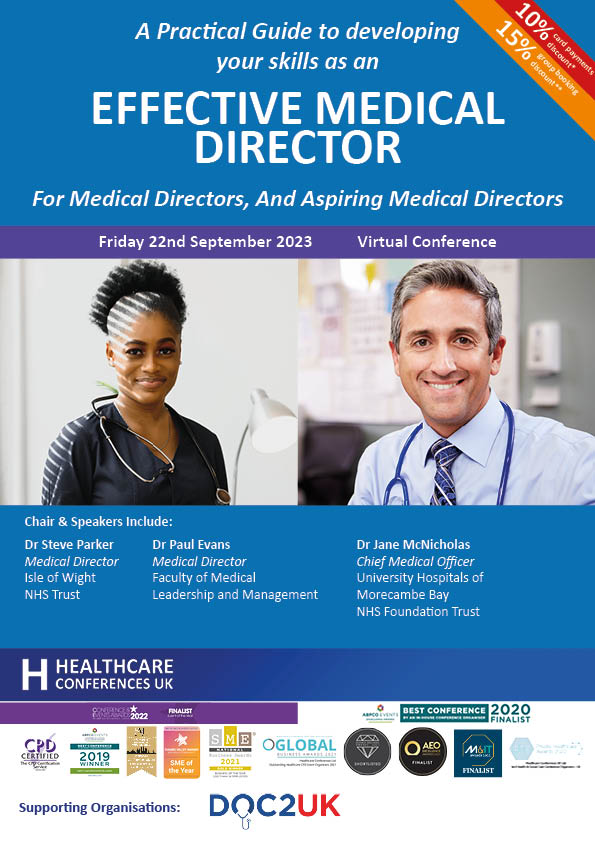Follow the conference on Twitter #MedicalDirector
Find out more about virtual attendance
Whether you are currently a Medical Director, or aspiring to be one, this virtual conference provides a unique opportunity to learn from, and connect with experienced Medical Directors, receive practical tips and advice, and develop your skills and competence as an effective Medical Director.
The unique role of NHS Medical Directors has never been more important. The event opens with an introduction to the skills and attributes required by an effective Medical Director and continues with a national update on quality and the role of the Medical Director in putting quality first in the boardroom.
The programme will focus on developing your leadership skills, Supporting Doctors during and beyond Covid-19 Creating the right clinical team environment to support Doctors Mental Health and Wellbeing, the role of the Medical Director on the board, managing concerns including revalidation decision making and working with dysfunctional teams or clinicians in difficulty. Delegates will have the opportunity to hear from a series of experienced Medical Directors including an extended interactive session which focuses on what the role is really like on a day to day basis and a problem solving and sharing interactive session facilitated by experienced Medical Directors.
This conference aims to develop the role of the Medical Director and to support current and aspiring Medical Directors to develop their skills and connect with experienced Medical Directors offering practical advice on developing the role in practice.
“The medical director’s role has been a statutory trust board position for 30 years. It is fundamental to any organisation that has high value, high quality patient care at its heart. Yet preparation for the role is often minimal. So like many of our peers then and now, we improvised, learning along the way, but it often felt uncomfortable. Those taking on this role are highly engaged, dedicated and passionate leaders. We owe it to them, to the NHS and, most of all, to our patients to do better…The medical director is a key board member. They do more than lend a clinical voice, but advocate for the patient at the organisation’s highest level and are crucial to improving the quality and value of care. A medical director plays a vital role in shaping their organisation’s culture and strategic vision and communicating this to staff on the front line.”
“With the increasing significance that has been attributed to clinical leadership over recent years, the role of the Medical Director is widely seen as more important than ever. Despite this, there appears to be a lack of clarity about the role, and also significant barriers to its uptake, most pertinently the issue of career progression and succession planning... FMLM found that Medical Directors believed that the most important qualities and behaviours needed to carry out the role successfully were personal resilience, integrity, honesty and openness, communication skills, and compassion.”
This conference will enable you to:
- Network and connect with current and aspiring Medical Directors
- Learn from experienced Medical Directors
- Reflect on national developments and learning
- Understand the role of the Medical Director on the board
- Develop your Leadership Skills
- Understand how to manage work/life balance and the demands of the role
- Identify key strategies for Supporting Doctors beyond Covid-19: Creating the right clinical team environment to support Doctors Mental Health and Wellbeing
- Explore the more challenging issues including dealing with concerns, dysfunctional teams and supporting doctors in difficulty
- Really understand what the role looks like on a day to day basis
- Reflect on role priorities
- Gain advice and tips for aspiring Medical Directors: Planning for the role
- Self assess and reflect on your own practice
- Supports CPD professional development and acts as revalidation evidence. This course provides 5hrs training for CPD subject to peer group approval for revalidation purposes



